DOWNLOAD NEWS 2015/2
by Brian Wilson and Dan Morgan
Reviews are by Brian Wilson unless stated otherwise.
DL News 2015/1 is here
and 2014/15 here.
Index 2015/2:
ARNOLD Symphonies 7-9; Oboe Concerto: Chandos
BACH Violin Concertos: DG
BACH Cantata No.199: SDG – See Handel below
BEETHOVEN Complete Works for cello and piano: Harmonia Mundi
BRAHMS Tragic Overture + MOZART, WAGNER: Beulah
BYRD, BULL, etc. The Virtuoso Organist: Tudor
and Jacobean Masterworks: Resonus
COPLAND Appalachian Spring : Beulah – see American Compositions
2 (below)
COPLAND The Tender Land : Suite: Beulah – see American
Compositions (below)
COUPERIN, F La Paix du Parnasse + RAMEAU, LEROUX:
Chandos
See also below: Beyond the River God
FRANCK Les Eolides , Symphonic Variations, Symphony:
Chandos
GERSWHIN An American in Paris : Beulah – see American
Compositions (below)
GERSHWIN Rhapsody in Blue : Beulah – see American Compositions
2 (below)
HANDEL, BACH and SCARLATTI live at Milton Court: SDG
HANDEL, SCARLATTI, etc. Et in Arcadia ego: Italian
Cantatas and Sonatas: Resonus
HAYDN Symphony No. 104 + LISZT Les Préludes, TCHAIKOVSKY:
Beulah
JANÁČEK Glagolitic Mass: Supraphon
LISZT Les Préludes : + HAYDN, TCHAIKOVSKY: Beulah
LISZT Sonata in b minor, etc.: Hyperion
LULLY Amadis , tragédie lyrique: Aparté
LULLY Suite from ‘Le Bourgeois Gentilhomme’ + MARAIS,
RÉBEL: Chandos
LYNCH – see below: Beyond the River God
MAHLER Top of FormSymphony No.3: CAVI
MARAIS Suite from ‘Alcyone’ + LULLY, REBEL: Resonus
McCABE Le Poisson Magique : Resonus
MEDTNER Piano Concerto No. 3 + SCRIABIN: BIS
MESSIAEN La Fauvette Passerinette : A Messiaen premiere:
Delphian
MOZART Divertimenti: Linn
MOZART Symphonies 38-40: Beulah
MOZART Symphony No.41 + BRAHMS, WAGNER: Beulah
MOZART The Joy of Mozart (Piano Concerto No.22, Symphony No.39,
etc.): Beulah
PÄRT Tintinnabuli : Gimell
RAMEAU Platée Suite + COUPERIN, Le
Roux: Resonus
RAMEAU Platéé, Pigmalion, Dardanus Suites: Naxos
RÉBEL Les Élémens + LULLY, MARAIS
SCHUMANN String Quartets: Dorian, Chandos, Naxos and Harmonia
Mundi
SCRIABIN Piano Concerto in f sharp minor + MEDTNER Piano
Concerto No. 3: BIS
SCRIABIN The Complete Poems: La Dolce Volta
SIBELIUS Complete Edition, Volumes 1-3: BIS
STANDFORD First Symphony; Cello Concerto: BMS/Naxos
SZYMANOWSKI Symphonies 1 and 3; Love Songs: Chandos
TCHAIKOVSKY Swan Lake Suite + HAYDN Symphony 104,
LISZT: Beulah
VILLA-LOBOS Symphony No. 10 ‘Ameríndia’: Naxos
WAGNER Die Meistersinger von Nürnberg Prelude + BRAHMS,
MOZART: Beulah
WEILL Symphonies 1 and 2: Naxos
ZIELEŃSKI Ortus de Polonia: K617
American Compositions: BERNSTEIN Candide Overture, SCHUMAN
New England Triptych, COPLAND The Tender Land: Suite,
BARBER Adagio for Strings, GERSWHIN An American in Paris:
Beulah
American Compositions 2 : GERSHWIN Rhapsody
in Blue, HARRIS Symphony No.3, GIANINNI Symphony No.3,
COPLAND Appalachian Spring: Beulah
Beyond the River God : Harpsichord works by Graham
LYNCH and François COUPERIN: Divine Art
The Marian Collection : Delphian
***
Mikołaj ZIELEŃSKI (Zelenscius)
(c.1550/60-c.1616/20) Ortus de Polonia
Ortus de Polonia [2:32]
Mirabilis Deus [3:17]
Mitte manum tuam [2:44]
In virtute tua, Domine [3:45]
Adoramus te, Christe [9:00]
Giovanni GABRIELI Canzon VIII [5:15]
Giovanni GABRIELI In ecclesiis [7:45]
Mikołaj ZIELEŃSKI Vox
in Rama [3:44]
Lætentur caeli [2:54]
Giovanni Pierlugi Da PALESTRINA/Giovanni BASSANO Introduxit
me Rex [3:51]
Mikołaj ZIELEŃSKI Posuisti
Domine [4:01]
Visionem quam vidistis [2:35]
Salve festa Dies [4:28]
Gloria et divitiæ [3:02]
Magnificat [6:51]
Cécile Dibon-Lafarge, Anne Magouët (sopranos; Paulin Bündgen, Yann Rolland
(altos) Vincent Bouchot, Benoït Haller, Hugues Primard (tenors); Cyrille
Gautreau, Renaud Delaigue (basses)
Les Traversées Baroques; Chœur des Fiori Musicali/Etienne Meyer
rec. October 2013
K617 K617248 [59:39] – from eclassical.com
(mp3, 16- and 24-bit lossless) or stream from
Qobuz or Naxos
Music Library. Pdf booklet with all three – but no texts.
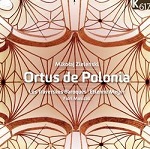
If you have a mind to explore Zieleński’s complete works, published
en bloc in 1611 – one of the few exact dates that we have for
him – there’s a 6-CD set from his native Poland on Dux DUX0864,
also available separately. (Review
of volumes 4-6; review
and review
of highlights CD).
My colleagues didn’t think those Dux recordings ideal but I believe
that listeners will be better served by this new offering from K617,
which also contains two works by Italian composers whose style clearly
influenced Zieleński’s music: significantly his complete works
were published in Venice. With very good performances and recording,
especially if you choose to pay a little extra for 24-bit, this is a
very enjoyable collection. Inexplicably, the booklet does not contain
the texts.
The Virtuoso Organist: Tudor and Jacobean Masterworks
William BYRD (c. 1540-1623) A Voluntarie for my Ladye Nevell
[5:05]
John BULL (1562/3-1628) Galliard [1:59]
Anonymous Bina cælestis II* [8:19]
John BULL In nomine II [4:34]
Thomas TALLIS (1505-1585) Ecce tempus idoneum * [3:49]
Thomas TOMKINS (1572-1656) Offertory [17:30]
John BLITHEMAN (1525-1591) Gloria tibi Trinitas I [2:15]
Gloria tibi Trinitas IV [2:15]
John BULL Coranto Joyeuse [1:08]
Anonymous Magnificat * [10:21]
Orlando GIBOONS (1583-1625) Fantasia [6:04]
Stephen Farr (organ)
The Taylor and Boody Organ (Opus 66) of Sidney Sussex College, Cambridge
(specification included in booklet)
rec. Sidney Sussex College Chapel, Cambridge, 16-17 March 2014. DDD.
Pdf booklet included – but no texts
RESONUS CLASSICS RES10143 [68:35] – from resonusclassics.com
(mp3, aac, 16- and 24-bit lossless)
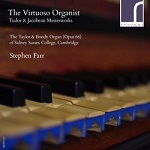 I
greatly enjoyed Stephen Farr’s earlier Resonus recording of Bach’s Clavierübung
(RES10120: Recording of the Month – DL
News 2013/8). Now he takes us further back in time with this excellent
recording of Tudor and Jacobean organ music, performed on the Taylor
and Boody instrument in Sidney Sussex Chapel, a handsome single-manual
instrument specially designed for the music of the period. The booklet,
freely available from Resonus,
gives full details, so I won’t repeat them except to say that it sounds
ideal for the music here.
I
greatly enjoyed Stephen Farr’s earlier Resonus recording of Bach’s Clavierübung
(RES10120: Recording of the Month – DL
News 2013/8). Now he takes us further back in time with this excellent
recording of Tudor and Jacobean organ music, performed on the Taylor
and Boody instrument in Sidney Sussex Chapel, a handsome single-manual
instrument specially designed for the music of the period. The booklet,
freely available from Resonus,
gives full details, so I won’t repeat them except to say that it sounds
ideal for the music here.
I was introduced to the keyboard music of John Bull by Thurston Dart’s
recordings for Oiseau-Lyre, some of which, containing renaissance and
later organ music, are available on Ismeron mono JMSCD1. Beulah Extra
offer a number of his recordings of Purcell and Handel but I live in
hope of someone reissuing SOL255, on which Dart performs the music of
Bull on the harpsichord.
The In Nomine was a peculiarly English form, an instrumental
piece based on the Benedictus qui venit in nomine Domini from
Taverner’s Missa Gloria Tibi Trinitas. Bull composed several:
three of his In Nomine, including No.II which Stephen Farr plays,
feature on an ATMA album devoted entirely to Bull’s organ music (ACD22239:
Kevin Komisaruk). There are no notes with any download of that recording,
so I have no idea of the organ specification. It’s a fine instrument
and the performances are good, but it sounds a little less well suited
to the music of Bull and his contemporaries than the Sidney Sussex instrument.
One complaint: surprisingly the texts of the sung works are not included
in the otherwise excellent booklet. You may be able to find them online,
but that’s not the point. I would have happily gone without some of
the photos of the building of the organ – but not the full specification
– in order to make room for the words.
Jean Baptiste LULLY (1632-1687) Amadis , tragédie
lyrique (1684)
Cyril Auvity, Judith Van Wanroij, Ingrid Perruche, Edwin Crossley-Mercer,
Benoît Arnould, Bénédicte Tauran, Hasnaa Bennani, Pierrick Boisseau,
Reinoud Van Mechelen, Caroline Weynants, Virginie Thomas
Chœur de Chambre de Namur
Les Talens Lyriques/Christophe Rousset
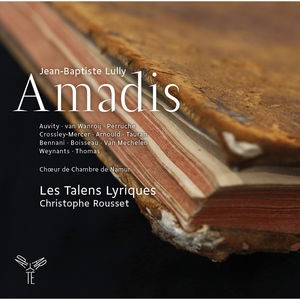 rec
Versailles, July 2013. DDD/DSD
rec
Versailles, July 2013. DDD/DSD
pdf booklet included
APARTÉ AP094 [2:44:04] – from Qobuz.com (mp3, 16- and 24-bit lossless) or stream from Naxos Music
Library (no booklet)
Christophe Rousset has already recorded Lully’s Belleréphon (AP015
– from eclassical.com,
mp3 and lossless, or stream from
Naxos Music Library – no booklet from either) and Phaéton
(AP061:
review – from
eclassical.com, mp3 and lossless, or stream from Naxos
Music Library – no booklet from either) for Aparté and Persée
for Naïve (E8874 – from eclassical.com,
mp3 and lossless, or stream from Naxos
Music Library – no booklet from either). With excellent performances,
this deserves a hearty recommendation.
Comédie et Tragédie : Volume 1
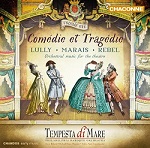 Jean-Baptiste
LULLY (1632-1687) Suite from ‘Le Bourgeois Gentilhomme’, Comédie-ballet,
LWV43 (1670) [18:12]
Jean-Baptiste
LULLY (1632-1687) Suite from ‘Le Bourgeois Gentilhomme’, Comédie-ballet,
LWV43 (1670) [18:12]
Jean-Féry RÉBEL (1666-1747) Les Élémens, Symphonie nouvelle
, (1737-38) [24:33]
Marin MARAIS (1656-1728) Suite from ‘Alcyone’, Tragédie en
musique, (1706) [24:17]
Tempesta di Mare Philadelphia Baroque Orchestra/Gwyn Roberts and Richard
Stone
rec. Gould Recital Hall, Curtis Institute of Music, Philadelphia, Pennsylvania,
USA, 9-11 June 2014. DDD
CHANDOS CHACONNE CHAN0805 [67:04] – from theclassicalshop.net
(mp3, 16- and 24-bit lossless)
This is not the first time that I have found Tempesta di Mare, despite
their name, to be slightly lacking in power – see full
review. It may be, however, that these very civilised performances
appeal more to you than to me, so I recommend trying them for yourself,
from Naxos
Music Library if you can.
Et in Arcadia ego : Italian Cantatas and Sonatas
George Frideric HANDEL (1685–1759)
Mi palpita il cor , HWV132a, for soprano, oboe and basso continuo
[13:00]
Pensieri notturni di Filli (Nel dolce dell’oblio), HWV134,
for soprano, recorder and basso continuo [7:34]
Alessandro SCARLATTI (1660–1725) Filli tu sai s’io t’amo
, for soprano, recorders and basso continuo [6:00]
George Frideric HANDEL Sonata for oboe and basso continuo,
HWV357 [8:11]
Alessandro SCARLATTI Bella s’io t’amo (Ardo è ver)
for soprano, recorder and continuo [12:36]
Francesco MANCINI (1672–after 1737) Sonata No.1 in d minor for
recorder and continuo [8:38]
Antonio LOTTI (1666–1740) Ti sento, O Dio bendato , for
soprano, oboe and continuo [10:59]
Concentus VII (Emily Atkinson (soprano), Louise Strickland (recorder),
Belinda Paul (oboe and recorder), Amélie Addison (cello), Martin Knizia
(harpsichord)
rec. St John’s Church, Loughton, Essex, 26-29 August 2013. DDD
pdf booklet includes texts and translations
RESONUS CLASSICS RES10142 [67:16] – from resonusclassics.com
or eclassical.com
(both mp3, 16- and 24-bit lossless; CD and aac additionally available
from resonusclassics.com) (NB: Resonus now offer some CDs as
well as downloads)
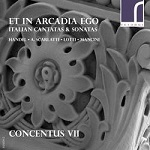 Two
of the short Italian cantatas which Handel wrote as a young man in Rome,
together with vocal and instrumental music from his contemporaries,
all loosely based on the theme of Arcadia. All the music here was composed
in the style associated with the Roman Pontificia Accademia degli
Arcadi (The Academy of Arcadia) but the phrase Et in Arcadia
ego (mors) is also associated with the concept of death – present
everywhere, even in the rural bliss of Arcadia, as in the famous painting
by Poussin, one version of which is illustrated on the Concentus VII
website.
Two
of the short Italian cantatas which Handel wrote as a young man in Rome,
together with vocal and instrumental music from his contemporaries,
all loosely based on the theme of Arcadia. All the music here was composed
in the style associated with the Roman Pontificia Accademia degli
Arcadi (The Academy of Arcadia) but the phrase Et in Arcadia
ego (mors) is also associated with the concept of death – present
everywhere, even in the rural bliss of Arcadia, as in the famous painting
by Poussin, one version of which is illustrated on the Concentus VII
website.
In the opening work, Mi palpita il cor, there’s some serious
competition around. Chief among these is a recording on which Emma
Kirkby with the AAM and Christopher Hogwood offer that and three other
Handel Italian cantatas, still available from Australian Decca Eloquence
(4767468 –
review and review).
That CD, which takes some beating, seems to be in short supply, so I
recommend purchasing while it’s still available.
Emma Kirkby sings HWV132b whereas Emily Atkinson on Resonus sings another
variant, HWV132a, but the difference involves only the instrumental
accompaniment, of which Handel made four versions. There’s not much
point in doing a head-to-head comparison because the couplings are completely
different.
Pensieri notturni di Filli also faces some strong competition,
this time from Roberta Invernizzi and La Risonanza/Fabio Biondi on one
of several very fine collections of Handel’s Italian cantatas on the
Glossa label (GCD921521 –
DL Roundup March 2009 – also on a budget-price 2-CD set GCDP10002
– DL
News 2013/13).
There’s one other recording of Bella s’io t’amo, from Clara Rottsolk
and Tempesta di Mare (Chandos CHAN0768), but, again, direct comparisons
are not very apt, since that recording couples other works by Scarlatti.
My colleague thought it lacked a degree of sparkle – review
– and I’ve also found Tempesta di Mare a bit lacking in zip on other
recordings. Both recordings feature a recently-discovered short opening
recitative with recorder obbligato, hence the new title for what used
to be known as Ardo è ver per te d’amore.
Of the three current alternative recordings for the Lotti, the chief
competition comes from Silvia Vajente and Epoca Barocca on CPO 7775832,
with music by Bononcini, Mancini, Domenico Scarlatti, Steffani and Vivaldi.
Johan van Veen thought this very enjoyable – review
– but, once again, the programme is different from the one on Resonus.
I couldn’t resist listening to the Kirkby and Invernizzi recordings
again and while both are very good, you wouldn’t mistake any one for
the other, but that’s as it should be. Take each on its own merits,
including the new Resonus download, and they are all very enjoyable.
Emily Atkinson possesses a voice of comparable purity with those of
Kirkby and Invernizzi and I could listen to all evening to any one of
them. Atkinson is very well supported by the other members of the ensemble
and the two purely instrumental items make very effective interludes.
I think I might be chary of a recording which feature all seven of Mancini’s
recorder sonatas, but
Dominy Clements and Johan
van Veen had so many good things to say about Gwyn Roberts and Tempesta
di Mare on Chandos CHAN0801 that I must investigate.
If the programme on Resonus appeals, you should go for it. This is
either Concentus VII’s debut or their second recording. Either way,
I hope to hear much more from them.
The least expensive download, on mp3, sounds very acceptable indeed,
but the 16- and 24-bit versions are worth the extra – as it happens,
I tried both the Resonus and eclassical.com downloads, and there is
nothing to choose between them. At current exchange rates there’s little
difference in price – Resonus charge in £UK and eclassical.com in $US.
Divine Noise: Theatrical music for two harpsichords
Jean-Philippe RAMEAU (1683-1764) Platée (1745) Suite (arr.
for two harpsichords by Guillermo Brachetta) [53:21]
François COUPERIN (1668-1733) La Paix du Parnasse: Sonade
en trio (1725) [7:55]
Gaspard Le ROUX (c. 1660-1707) Suite in F (1705) [13:08]
Guillermo Brachetta (harpsichord)
Menno van Delft (harpsichord)
Harpsichord after Henri Hemsch, 1736 (MFA Boston), by Titus Crijnen,
Amsterdam, 1995
Harpsichord after François Etienne Blanchet, 1730, by Titus Crijnen,
Sabiñan, 2013
rec. Ouderkerk, Bunnik, Netherlands, 28-31 May 2014. DDD.
pdf booklet included
RESONUS CLASSICS RES10145 [74:26] – from resonusclassics.com
or eclassical.com
(both mp3, 16- and 24-bit lossless; aac also available from resonusclassics.com.)
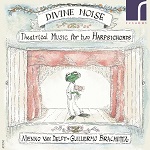 There
used to be metal-framed harpsichords the size of a pickup truck which
made a huge noise. I owned an LP of Rafael Puyana playing such a monster
which, surprisingly, sold for more than any single record in my collection
when I cleared it out, so there must be a market for such a sound somewhere.
Now Resonus bring the next-best thing if that’s what you are looking
for: two harpsichords certainly make a ‘noise’, though I’m not sure
how many would call it ‘divine’.
There
used to be metal-framed harpsichords the size of a pickup truck which
made a huge noise. I owned an LP of Rafael Puyana playing such a monster
which, surprisingly, sold for more than any single record in my collection
when I cleared it out, so there must be a market for such a sound somewhere.
Now Resonus bring the next-best thing if that’s what you are looking
for: two harpsichords certainly make a ‘noise’, though I’m not sure
how many would call it ‘divine’.
Though the booklet quotes Charles Burney’s appreciation of such a combination,
I have to say that I find the result a little too relentless. There
are quieter passages, with one or both of the players using the buff
stop – try track 5 – but in such passages the playing seems a little
four-square to me, perhaps because two keyboard instruments cannot capture
the variety of the original orchestration of the Rameau.
This isn’t the first time that such arrangements of his theatrical music
for two harpsichords have been recorded – Skip Sempé and Pierre Hantai
recorded selections from Platée and other works on Mirare MIR164
– and Segovia transcribed the Menuet for guitar (Naxos 8.111092),
but you need only listen to the European Union Baroque Orchestra/Roy
Goodman on Naxos (8.557490 with suites from Pigmalion
and Dardanus – review)
to find the instrumental colour that my ear was craving.
I enjoyed the Couperin more, since this was written as a trio sonata
and is thus well within the scope of two keyboards, as performed also
by William Christie and Christophe Rousset (Harmonia Mundi, budget price)
or Lucy Carolan and John Kitchen on Delphian. Here again, however,
I missed the variety of instrumentation to be found on recordings of
Couperin’s Apothéoses, to which la Paix is related, such
as that recorded by Ricercar Consort (Mirare MIR150) or London
Baroque (BIS-CD-1275 – DL
News 2013/11).
The Mirare recording is available in mp3, 16- and 24-bit lossless
from eclassical.com,
complete with pdf booklet. In addition to La Paix it contains
the Apothéoses for Corelli and Lully and Le Tombeau de Lully.
It can be streamed, with booklet, from
Qobuz. My only reservation is that, like the BIS recording, the
spoken titles of the Apothéoses are tiresome on repetition.
For all my reservations, the quality of the playing on Resonus is excellent:
I can only marvel with envy at the way in which both players toss off
the ornaments with apparent ease.
Beyond the River God : Harpsichord works by Graham
LYNCH (b.1957) and François COUPERIN (1668-1733)
Assi Karttunen (harpsichord)
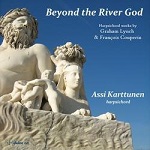 rec.
Östersundom Church, Helsinki, 2-4 June 2014.
rec.
Östersundom Church, Helsinki, 2-4 June 2014.
DIVINE ART DDA25120 [78:25] – from eclassical.com
(mp3, 16- and 24-bit lossless) or stream from
Naxos Music Library or Qobuz
(pdf booklet included with all three).
Please see review
by John France for full details: ‘Application of the concept of playing
François Couperin and Graham Lynch back-to-back has been highly successful.
The Baroque works are full of charm and interest whilst the modern pieces
are approachable, well-crafted and musically satisfying. The performance
of both Couperin and Lynch is ideal.’
There is more Lynch here than Couperin but old and new sit well together
on this album – by no means a given with such mixtures.
Handel, Bach and Scarlatti live at Milton Court is a new
release from John Eliot Gardiner, Esther Brazil (mezzo),the Monteverdi
Choir and English Baroque Soloists on their in-house label Soli Deo
Gloria (SDG502 [87:22] – from eclassical.com,
mp3, 16- and 24-bit lossless, with pdf booklet). The 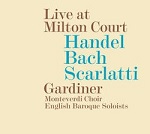 programme
consists of Domenico SCARLATTI Stabat Mater [27:38],
J.S. BACH Mein Herze schwimmt in Blut, BWV199 [25:17]
and HANDEL Dixit Dominus, HWV232 [34:27]. The performances,
recorded live in September 2014, are all that we have come to expect
from these musicians.
programme
consists of Domenico SCARLATTI Stabat Mater [27:38],
J.S. BACH Mein Herze schwimmt in Blut, BWV199 [25:17]
and HANDEL Dixit Dominus, HWV232 [34:27]. The performances,
recorded live in September 2014, are all that we have come to expect
from these musicians.
I have just one small grumble: the translation of Dixit Dominus
(Psalm 110) is taken from the Book of Common Prayer and differs from
the Latin text quite considerably in verse 3. The Latin means: With
thee is the principality in the day of thy strength, in the splendour
of the saints: I begot thee from the womb before the day star.
Neither the Latin – derived from the Greek Septuagint – nor the Prayer
Book, partly from Luther’s translation of the original Hebrew and partly
from the Latin, makes much sense in this verse and modern translations
paraphrase.
Johann Sebastian BACH (1685-1750) Violin Concertos
Violin Concerto in a minor, BWV 1041 [12:54]
Violin Concerto in E, BWV 1042 [15:53]
Concerto for two violins, strings and continuo in d minor (Double Concerto),
BWV 1043 [13:59]
Concerto for violin, strings and continuo in g minor, BWV 1056R [9:15]
Concerto for violin, strings and continuo in d minor, BWV 1052R [21:16]
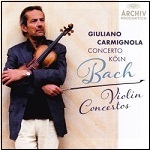 Concerto
Köln/Giuliano Carmignola (baroque violin)
Concerto
Köln/Giuliano Carmignola (baroque violin)
Mayumi Hiratsuka (leader, violin I, BWV 1043)
rec. Kammermusiksaal, Deutschlandfunk, Köln, Germany, July 2013
ARCHIV PRODUKTION 4792695 [73:44]
Michael Cookson reviewed
this alongside a similar recording from Viktoria Mullova which I’d recommended
in DL News some time ago (ONYX4114 – 2013/10).
Both are very good but, as MC reports, given a straight choice Carmignola
is ahead and ‘in a class of [his] own’. With sheer energy but never
sounding hard-driven and in excellent sound – heard streamed from Qobuz
– I can only strongly agree. At £11.56 the Qobuz 16-bit download –
with pdf booklet – is only pence less expensive than the CD: surely
the Amazon UK price of £45.52 when I checked is a typo? 7
digital.com offer a 320kb/s download for £8.49 – no booklet.
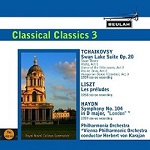 Classical
Classics 3
Classical
Classics 3
Pyotr Ilyich TCHAIKOVSKY (1840-1893) Swan Lake Suite,
Op.20 [21:10]
Franz LISZT (1811-1886) Les Préludes , Symphonic Poem,
S97 [16:04]
Joseph HAYDN (1732-1809) Symphony No. 104 in D, London*
[26:06]
Philharmonia Orchestra; Vienna Philharmonic Orchestra*/Herbert von Karajan
rec. 1958 and 1959. ADD/stereo
BEULAH 3PDR2 [63:22] – from amazon.co.uk
(mp3)
Unless you have already purchased the three components of this album
– bought separately from Beulah Extra they cost slightly less – and
if their placement together appeals, this is another fine reissue. Please
see review.
The Joy of Mozart
Wolfgang Amadeus MOZART (1756-1791)
Così fan tutte , K588: Overture [5:06]
Sinfonia of London/Muir Mathieson
First released on World Record Club T21. ADD/stereo
Così fan tutte Act I: Come scoglio [6:08]
Helen Lawrence (soprano)
National Philharmonic Orchestra/Robin Stapleton
Beulah live recording, 1979. ADD/stereo
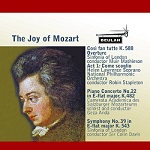 Piano
Concerto No. 22 in E-flat, K482 [33:34]
Piano
Concerto No. 22 in E-flat, K482 [33:34]
Camerata Academica des Salzburger Mozarteums/Géza Anda (piano)
First released on DG SLPM138824 in 1962. ADD/stereo
Symphony
No. 39 in E-flat, K543 [28:44]
Sinfonia of London/Sir Colin Davis
First released on World Record Club ST43 in 1960. ADD/stereo
BEULAH 1PDR6 [73:34] – from amazon.co.uk
(mp3)
These recordings are all available separately from Beulah Extra but
hang together well to form a satisfying programme.
Please see full review.
Wolfgang Amadeus MOZART (1756-1791)
Serenade No.11 in E flat, K375 (version for wind sextet) [25:56]
Divertimento in F, K253 [10:47]
Divertimento in B flat, K270 [10:10]
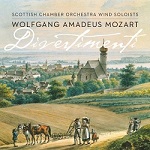 Divertimento
in E flat, K252/240a [9:37]
Divertimento
in E flat, K252/240a [9:37]
Divertimento in B flat, K240 [10:37]
Scottish Chamber Orchestra Wind Soloists
rec. Royal Conservatoire of Scotland, Glasgow, 5-7 April 2014. DDD/DSD
LINN RECORDS CKD479 [67:08] – from linnrecords.com
(SACD, mp3, 16- and 24-bit and 24/192 downloads or hyperion-records.co.uk
(mp3, 16- and 24-bit lossless). Both include pdf booklet.
Without suggesting that these new performances of Mozart’s lighter music
are quite in the same category as Linn’s recordings of the late symphonies
from Sir Charles Mackerras, they are very fine in every respect: performance,
recording and presentation all make this a very worthy successor to
the earlier Linn/SCO recording of the Serenade, K185 and Divertimento,
K113 (now re-numbered as BKD287 – review).
Please see full review.
Wolfgang Amadeus MOZART (1756-1791)
Symphony No. 38 in D Prague, K504 [25:46]
Symphony No. 39 in E flat, K543 [28:17]
Symphony No. 40 in g minor, K550 [26:54]
Philharmonia Orchestra/Otto Klemperer
rec. 1961. ADD/stereo
BEULAH 1PD98 [80:58] – from amazon.co.uk
(mp3)
Classical Classics 2
Johannes BRAHMS (1833-1897) Tragic Overture, Op. 81 [12:30]
Christoph GLUCK (1714-1787) Iphigenia en Aulide Overture
[11:24]
Wolfgang Amadeus MOZART Symphony No. 41 in C, K551 [29:51]
Richard WAGNER (1813-1883) Die Meistersinger von Nürnberg
Prelude [10:53]
Philharmonia Orchestra/Otto Klemperer
rec. 1960/1. ADD/stereo
BEULAH 2PDR2 [64:39] – from amazon.co.uk
(mp3)
Beecham Conducts Mozart
Wolfgang Amadeus MOZART
Symphony No. 34 in C Jupiter, K338 [21:14]
Clarinet Concerto in A, K622 [31:14]
Die Zauberflöte , K620, Act I, Scene 3 finale [11:36]
Jack Brymer (clarinet)
Tiana Lemnitz (soprano), Gerhard Hüsch (baritone), Heinrich Tessmer,
Helge Rosvaenge (tenors) Wilhelm Strienz (bass), Favres Solisten Vereinigung
London Philharmonic Orchestra, Royal Philharmonic Orchestra, Berlin
Philharmonic Orchestra/Sir Thomas Beecham
rec. 1937-60
BEULAH 1PDR4 [64:04] – from amazon.co.uk
(mp3)
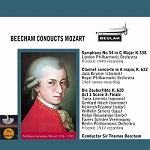
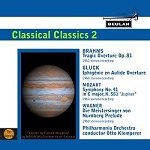
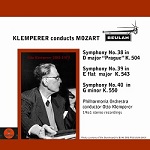
Klemperer’s Mozart is far less stodgy than conventional wisdom would
have us believe; his Brahms is excellent and the Wagner rather sedate
but enjoyable.
Beecham fans will be well served by 1PDR4, though I should warn
that the excerpt from his Zauberflöte will make you want more.
All the recordings have come up well.
Please see full review.
Ludwig van BEETHOVEN (1770-1827) Complete Works for cello
and piano (1796-1815)
Variations on Mozart’s ‘Ein Mädchen oder Weibchen’ in F, Op.66 [9:54]
Sonata No.1, Op.5/1 in F [22:28]
Sonata No.2, Op.5/2 in g minor [26:29]
Variations in G on Handel’s ‘See, the Conqu’ring Hero comes’, WoO 45
[12:09]
Sonata No.3, Op.69 in A [25:30]
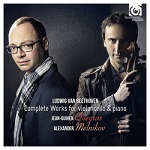 Variations
on Mozart’s ‘Bei Männern welche Liebe fühlen’, WoO 46 [8:58]
Variations
on Mozart’s ‘Bei Männern welche Liebe fühlen’, WoO 46 [8:58]
Sonata No.4, Op.102/1 in C [14:36]
Sonata No.5, Op.102/2 in D [18:31]
Jean-Guihen Queyras (cello); Alexander Melnikov (piano)
rec. Teldex Studio Berlin October and December 2013 DDD.
Pdf booklet included.
HARMONIA MUNDI HMC 902183.84 [71:03 + 67:39] – from eclassical.com
(mp3, 16- and 24-bit lossless)
‘This set confirms Queyras as an estimable talent with a lot to offer.
The presentation and documentation are up to HM’s usual high standards’.
Please see review
by Simon Thompson.
Robert SCHUMANN (1810-1856)
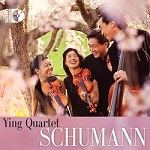
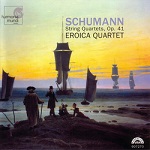 A
new recording of the three string quartets, Op.41/-3, from the Ying
Quartet (Dorian Sono Luminus DSL-92184 [73:41] – from
eclassical.com, mp3, 16- and 24-bit lossless, with pdf booklet,
or stream from Naxos
Music Library) comes up against strong opposition, not least from
the Eroica Quartet on Harmonia Mundi (HMC907270 [78:43] – from
eclassical.com,
mp3 and lossless, or stream from
Naxos Music Library) and, at budget price, the Fine Arts Quartet
on Naxos (8.570151 [79:06]: review
– from
classicsonline.com, mp3, with pdf booklet, or stream from Naxos
Music Library).
A
new recording of the three string quartets, Op.41/-3, from the Ying
Quartet (Dorian Sono Luminus DSL-92184 [73:41] – from
eclassical.com, mp3, 16- and 24-bit lossless, with pdf booklet,
or stream from Naxos
Music Library) comes up against strong opposition, not least from
the Eroica Quartet on Harmonia Mundi (HMC907270 [78:43] – from
eclassical.com,
mp3 and lossless, or stream from
Naxos Music Library) and, at budget price, the Fine Arts Quartet
on Naxos (8.570151 [79:06]: review
– from
classicsonline.com, mp3, with pdf booklet, or stream from Naxos
Music Library).
Much as I enjoyed the new recording – the 4- and 5-star responses on
Amazon are certainly merited – the Eroica Quartet remain my benchmark:
I can’t remember a better set of performances than these, though I also
greatly enjoyed the Doric Quartet on Chandos (CHAN10692 – review
and DL
Roundup November 2011/2). Audiophiles should note that the Ying
Quartet performances are also available on blu-ray audio disc from
Amazon UK and Amazon
US.
Franz (Ferenc) LISZT (1811-1886)
Sonata in b minor, S178 (1857) [34:19]
Sonetto di Petrarca No.47 (Années de pèlerinage: Italie,
S161. No.4) (1846) [6:24]
Sonetto di Petrarca No.104 (Années de pèlerinage: Italie,
S161, No.5) (1846) [7:35]
Sonetto di Petrarca No.123 (Années de pèlerinage: Italie,
S161, No.6) (1846) [7:58]
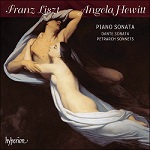 Après
une lecture du Dante - Fantasia quasi Sonata (Années de pèlerinage:
Italie, S161, No.7) (1846) [18:15]
Après
une lecture du Dante - Fantasia quasi Sonata (Années de pèlerinage:
Italie, S161, No.7) (1846) [18:15]
Angela Hewitt (piano)
rec. Jesus-Christus-Kirche, Berlin, Germany, May 2014. DDD
HYPERION CDA68067 [74:31] – from hyperion-records.co.uk
(mp3, 16- and 24-bit lossless, with pdf booklet)
Reviewing this recording for the main MusicWeb International pages alongside
an Odradek recording by Domenico Codispoti (ODRCD303), Geoffrey Molyneux
preferred Angela Hewitt and thought performance and recording in every
way competitive with previous recommendations.
The pricing of the Odradek recording as a download defies all logic
– buy it on CD from Amazon
UK for £5.84 rather than the mp3 from the same suppliers for £7.99.
César FRANCK (1822-1890)
Les Eolides [9:23]
Symphonic Variations for piano and orchestra* [15:51]
Symphony in d minor [36:12]
Louis Lortie (piano)*
BBC Philharmonic/Yan Pascal Tortelier
rec. January 2000. DDD
pdf booklet available
CHANDOS CHAN9875 [61:47] – from theclassicalshop.net
(mp3, 16- and 24-bit lossless)
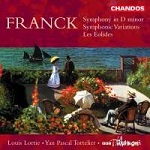 It
had been quite some time since I listened to the Franck Symphony when
I heard the Monteux recording (RCA) on Radio 3: a stupendous performance,
still sounding well, but not easy to come by on disc, where it’s tied
up in multi-CD sets. It can be downloaded in mp3 from 7digital and
Sainsburys’ Entertainment and in lossless sound from Qobuz but you may
not think the coupling of Petrushka, fine as it is, appropriate.
Similarly, the Beecham recording, once separately available with Lalo,
is bound up in the box set The French Collection: well worth
having (review
review)
but you may already have, for example, the Symphonie Fantastique
from that set. If you are as much a Beecham fan as I am but don’t want
the box, the single album is available in 320kb/s mp3 for £5.99 from
sainsburysentertainment.co.uk .
It
had been quite some time since I listened to the Franck Symphony when
I heard the Monteux recording (RCA) on Radio 3: a stupendous performance,
still sounding well, but not easy to come by on disc, where it’s tied
up in multi-CD sets. It can be downloaded in mp3 from 7digital and
Sainsburys’ Entertainment and in lossless sound from Qobuz but you may
not think the coupling of Petrushka, fine as it is, appropriate.
Similarly, the Beecham recording, once separately available with Lalo,
is bound up in the box set The French Collection: well worth
having (review
review)
but you may already have, for example, the Symphonie Fantastique
from that set. If you are as much a Beecham fan as I am but don’t want
the box, the single album is available in 320kb/s mp3 for £5.99 from
sainsburysentertainment.co.uk .
Gary S Dalkin thought it unlikely that the composer could be in better
hands than Tortelier’s – review.
I agree, as also with his comments on the very good recording quality
– heard in 24/44.1 format – and presentation. All in all this is the
safest recommendation for a download of this work and the couplings
are well worth hearing, too.
Leoš JANÁČEK (1854–1928)
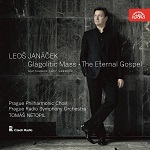 Leslie
Wright’s award of the Recording of the Month accolade
to the recent recording by Tomáš Netopil on Supraphon SU40512 –
review – prompts me to repeat what I wrote in DL
News 2014/13:
Leslie
Wright’s award of the Recording of the Month accolade
to the recent recording by Tomáš Netopil on Supraphon SU40512 –
review – prompts me to repeat what I wrote in DL
News 2014/13:
My Desert Island work by Janácek would have to be the Glagolitic
Mass. Hitherto my favourite recordings have been from Karel Ancerl,
the recording on which I first heard the work (Supraphon SU36672,
with Taras Bulba – review),
Antoni Wit (Naxos 8.572639 with Sinfonietta – December
2011/1) and Sir Charles Mackerras (Chandos CHAN9310, with
Kodály Psalmus Hungaricus – also December
2011/1). The Ancerl is also available from Beulah: 1PD66
– 2013/16:
stream from Qobuz.
The Mackerras is described as the original version, but recent research
has cast doubts on that attribution and a new recording has recently
appeared which claims to be the true original from September 1927: (Prague
Philharmonic Choir, Prague Radio SO/Tomáš Netopil: Supraphon SU40512
– from emusic.com,
mp3, no booklet). Alongside that new recording I have been listening
to the final version on an ArcoDiva recording, coupled, like the new
Supraphon, with The Eternal Gospel (Czech Philharmonic Choir,
Czech Symphony Orchestra, Brno/Leos Svarovsky: UP0011-2231 –
review – from eclassical.com,
mp3 and lossless, no booklet. Stream from Qobuz.
CD £12 from MusicWeb
International).
I have to admit that I didn’t notice too many differences between the
Netopil and the Mackerras recordings or, to be honest, between either
of these ‘original’ versions and the final masterpiece. It’s a very
powerful work in either form and all concerned on the new Supraphon
do it full justice. I didn’t know The Eternal Gospel, but this
performance has ‘sold’ it to me. The emusic.com download weighs in
at about 225kb/s – far from ideal, but it sounds well enough, with a
little volume boost, and it’s almost as good as you are likely to get
by paying more from Amazon and iTunes.
The ArcoDiva comes in lossless sound and, though older than the Netopil,
sounds excellent. Marc Bridle thought very highly of the performances
– see link above – and I, too, was most impressed. There’s plenty of
power in all the recordings that I have mentioned. Fans of the original
can safely choose between Mackerras and the more authentic Netopil,
while those who favour the final version can choose between Ancerl,
Wit and Svarovsky on the basis of coupling and/or price.
The lack of booklet with either of these downloads is a serious problem
– Old Slavonic liturgical texts are not exactly common knowledge – but
Chandos generously offer theirs free to all comers.
Gustav MAHLER (1860-1911)
Symphony No.3 in d minor (1893-1896, rev. 1906)
Ewa Marcinic (alto)
Ladies of Domkantorei St Martin & Boys Choir of the Mainzer Domchor
Staatsorchester Rheinische Philharmonie Koblenz in cooperation with
Philharmonisches Staatsorchester Mainz/Daniel Raiskin
rec. 13 December 2013, Rhein-Mosel-Halle, Koblenz, Germany
No booklet
CAvi MUSIC AVI 8553325 [101:15] – from eclassical.com
(mp3, 16- & 24-bit lossless)
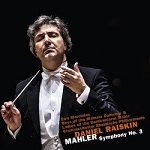 Conductor
Daniel Raiskin blasted into my ken with a recording of Shostakovich’s
Fourth Symphony that became one of my Recordings of the Year
for 2011 (review).
More than that it’s now at the top of my list of recommended versions
of that work, such is the level of intensity and insight on display
here. Even the orchestra – hardly front-rankers – acquit themselves
well.
Conductor
Daniel Raiskin blasted into my ken with a recording of Shostakovich’s
Fourth Symphony that became one of my Recordings of the Year
for 2011 (review).
More than that it’s now at the top of my list of recommended versions
of that work, such is the level of intensity and insight on display
here. Even the orchestra – hardly front-rankers – acquit themselves
well.
Musically the first movement of this Mahler 3 is decent enough, but
it doesn’t take long to realise that the performance burns with a very
low flame. The kind of internal tensions that make Lorin Maazel’s live
Philharmonia account so electrifying are nowhere to be found (review).
Even more disappointing is the variable playing. The second and third
movements lack character and those echt-Viennese rhythms are
somewhat leaden. The recording is nothing special, either.
Alas, it gets worse, much worse; ‘O Mensch!’ is taken at a dirge-like
tempo, so alto Ewa Marcinic – whose voice is devoid of colour or nuance
anyway – is doomed from the start. I simply can’t recall a more woeful
rendition of this glorious solo. Even the boys seem a tad glum; as well
they might, for the pale, pulseless finale turns a merely mediocre performance
into a disastrous one. As if that weren’t enough this lamentable release
is sold sans booklet.
Dismal.
Dan Morgan
Jean SIBELIUS (1865-1957)
BIS are releasing the volumes of the complete Sibelius Edition as downloads
from eclassical.com month by month during the commemorative year, 2015.
The CD sets are inexpensive – 6 discs for the price of 3 – and the download
versions from eclassical.com, originally on offer for just over $30,
are also competitive now – they used to be as uncompetitive as the downloads
of the 15-CD The
Essential Sibelius from the same providers: $168.55 against
around £50 for the discs. If you can accept decent mp3 there’s an even
better bargain: an orchestral selection of about half of the BIS series
from Amazon UK , incredible value at £6.99.
With fewer alternatives included – just the 1915 and 1919 versions of
Symphony No.5 – it’s worth downloading the Amazon album at the price
for convenience in finding what you want, even if you go for one or
more of the Sibelius Edition sets.
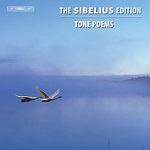 Volume
1 (BIS-CD-1900/02), released in late 2014, contains all the Tone
Poems, including variants in some cases: to quote BIS’s boss Robert
von Bahr, ‘first versions, last versions, intermediate versions, variants,
everything’. Full details of this and the other first five volumes
can be found in Rob Barnett’s 2009 review.
I need only add that these are authoritative performances and that they
can be obtained from eclassical.com.
Be careful not to choose the alternative version of this volume, still
available at around twice the price.
Volume
1 (BIS-CD-1900/02), released in late 2014, contains all the Tone
Poems, including variants in some cases: to quote BIS’s boss Robert
von Bahr, ‘first versions, last versions, intermediate versions, variants,
everything’. Full details of this and the other first five volumes
can be found in Rob Barnett’s 2009 review.
I need only add that these are authoritative performances and that they
can be obtained from eclassical.com.
Be careful not to choose the alternative version of this volume, still
available at around twice the price.
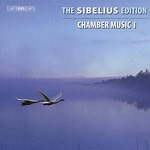 Volume
2 came in January 2015 (BIS-CD-1903/05) containing part 1 of
the Chamber Music – from
eclassical.com. If, like me, you know only the String Quartet,
Voces Intimæ, which receives a very good performance, there’s
a good deal more interesting music for you to discover. This may be
the least urgent recommendation, with good alternatives for the String
Quartet and the Piano Quintet (Coull Quartet, with Martin Roscoe in
the Quintet, SommSOMMCD096 or Gabrieli Quartet with Anthony Goldstone,
Chandos CHAN8742 – download from theclassicalshop.net,
mp3 and lossless, with booklet) or, for the Quartet, the
Volume
2 came in January 2015 (BIS-CD-1903/05) containing part 1 of
the Chamber Music – from
eclassical.com. If, like me, you know only the String Quartet,
Voces Intimæ, which receives a very good performance, there’s
a good deal more interesting music for you to discover. This may be
the least urgent recommendation, with good alternatives for the String
Quartet and the Piano Quintet (Coull Quartet, with Martin Roscoe in
the Quintet, SommSOMMCD096 or Gabrieli Quartet with Anthony Goldstone,
Chandos CHAN8742 – download from theclassicalshop.net,
mp3 and lossless, with booklet) or, for the Quartet, the 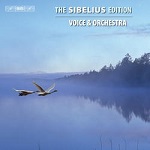 Dante
Quartet (Hyperion CDA67845, with Smetana –
review and DL
Roundup August 2011/1) but it’s also the one with most for listeners
to gain.
Dante
Quartet (Hyperion CDA67845, with Smetana –
review and DL
Roundup August 2011/1) but it’s also the one with most for listeners
to gain.
Volume 3, Voice and Orchestra, was released in February 2015
(BIS-CD-1906/08) – from eclassical.com.
The music which I already knew, such as Kullervo – a vocal symphony
in all but name – Luonnotar – a different version from that in
Volume 1 – and the songs, receives very good performances but there’s
much more awaiting your discovery, including several alternative versions.
All three bundles, as they are called, come with pdf booklets. The
keen-eyed will have spotted that the covers are not quite identical
– the swans move slightly from left to right but the camera stays with
them.
Alexander SCRIABIN (1872-1915) The Complete Poems
Pascal Amoyel (piano)
rec. no details given
Pdf booklet included
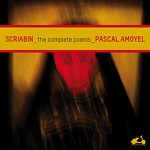 LA
DOLCE VOLTA LDV250 [74:47] – from eclassical.com
(mp3, 16- & 24-bit lossless)
LA
DOLCE VOLTA LDV250 [74:47] – from eclassical.com
(mp3, 16- & 24-bit lossless)
The French pianist Pascal Amoyel, who has won much praise for his Chopin,
is new to me. I had occasion to hear his Scriabin Poèmes when
reviewing Garrick Ohlsson’s all-conquering traversal for Hyperion (
review).
There are things to enjoy here – Amoyel has a way of pointing up a particular
melody or calling attention to an ambiguous harmony – but when heard
alongside Ohlsson he seems much too generalised in his approach. He
simply can’t match the American’s rhythmic/colouristic finesse and his
abundance of insight; also, La Dolce Volta’s big, bold recording doesn’t
always match the intimacy of these miniatures.
Decent, but no match for the best.
Dan Morgan
Alexander SCRIABIN (1872-1915)
Piano Concerto in f sharp minor Op.20 [26:36]
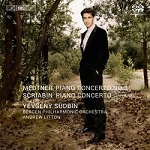 Nikolai
MEDTNER (1880-1951)
Nikolai
MEDTNER (1880-1951)
Piano Concerto No. 3, Op. 60 ‘Ballade’ [35.16]
Yevgeny Sudbin (piano)
Bergen Philharmonic Orchestra/Andrew Litton
rec. November 2013, Grieghallen, Bergen, Norway
pdf booklet included
BIS-SACD-BIS2088 [62:42] – from
eclassical.com
(mp3, 16- and 24-bit lossless)
Rich romantic music in very fine performances. Stephen Greenbank thought
that ‘On the evidence here, there is no doubt in my mind that Sudbin’s
discographical legacy is going from strength to strength.’ (Review).
The mp3 recording is good but the 24-bit is worth the extra.
Karol SZYMANOWSKI (1882-1937)
Symphony No.3 in f minor, Op.27 (The Song of the Night) (1916), for
tenor solo, mixed choir, and large orchestra [26:03]
Love Songs of Hafiz , Op.26 (1911), for voice and orchestra [21:06]
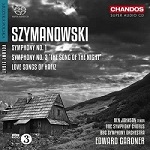 Symphony
No.1, Op.15 (1906-7) [18:55]
Symphony
No.1, Op.15 (1906-7) [18:55]
Ben Johnson (tenor)
BBC Symphony Chorus
BBC Symphony Orchestra/Edward Gardner
rec. Watford Colosseum, Maida Vale Studios, London and Fairfield Halls,
Croydon; 2013/14.
Texts and translations included.
CHANDOS CHAN5143 [65:54] – from theclassicalshop.net
(mp3, 16- and 24-bit lossless, with pdf booklet).
I reviewed
this on the main MusicWeb International pages from both the SACD (CHSA5143)
and 24-birt downooad and found little to choose between the two formats.
Heitor VILLA-LOBOS (1887-1959)
Symphony No. 10 ‘Ameríndia’ (Sumé, Father of Fathers) Oratorio for tenor,
baritone, bass, mixed chorus and orchestra (1954) (revised edition:
Editora Criadores do Brasil)
Leonardo Neiva (baritone), Saulo Javan (bass)
São Paulo Symphony Orchestra and Choir/Isaac Karabtchevsky
rec. Sala São Paulo, Brazil, 2-16 February 2013. DDD
Latin, Portuguese and Tupi sung texts included in pdf booklet
NAXOS 8.573243 [60:47] – from eclassical.com
(mp3 and lossless) or
classicsonline.com (mp3 and lossless) or stream from Naxos
Music Library
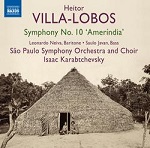
Villa-Lobos’ Symphony No.10, composed to celebrate the 400th
anniversary of the founding of São Paulo, is really a symphony-oratorio.
It may not match the quality of his similar hybrid, Floresta do Amazonas
(1958) – BIS-SACD-1600 – DL
Roundup March 2011/1 – but it’s well worth hearing in this enthusiastic
recording. Back in DL
News 2012/20 I welcomed Karabtchevsky’s recording of Villa-Lobos’
Symphonies 6 and 7 at the start of the Naxos series and the new recording
is a worthy successor, with just one small oddity: the solo tenor part
is sung by the tenors of the choir.
Both COL and eclassical.com offer mp3 and lossless: COL, at £4.99, have
the better bargain for mp3 but at current exchange rates COL’s £6.99
and eclassical’s $10.94 work out almost exactly equal. You may prefer
eclassical’s retention of the track divisions: COL’s lossless downloads
come as one long file.
Kurt WEILL (1900-1950)
Symphony No. 2 (1933-1934) [29:40]
Symphony No. 1 (1921) [26:50]
Lady in the Dark – Symphonic Nocturne (concert suite arr. Robert
Russell Bennett) [17:32]
Bournemouth Symphony Orchestra/Marin Alsop
rec. 12-14 January 2004, Lighthouse Concert Hall, Poole, Dorset, UK
Pdf booklet included
NAXOS 8.557481 [74:02] – from eclassical.com
(mp3, 16- & 24-bit lossless) or classicsonline.com
(mp3) or stream from Naxos Music Library
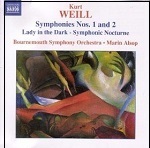
This recording has been around a while, but reading Gwyn Parry-Jones’s
enthusiastic CD review
prompted me to remind listeners of its existence. It’s the kind of peripheral
repertoire at which Alsop excels, and the Bournemouth Symphony that
she led from 2002 to 2008 play very well for her. Really, these underrated
symphonies couldn’t have a better advocate. As for the symphonic nocturne:
that’s the icing on the cake. Now languid now luscious, Bennett’s jazzy
arrangement had me tapping my toes from start to finish. As Gwyn says,
this is a ‘very special issue’.
A small point. I reviewed the 24-bit version, which actually displays
on my DAC as 21-bit. Apparently some of these earlier recordings do,
but it doesn’t mean they sound the worse for that.
Little-known rep that deserves a wider audience; terrific performance
and recording.
Dan Morgan
Olivier MESSIAEN (1908-1992)
La Fauvette Passerinette : A Messiaen premiere with birds, landscapes
and homages
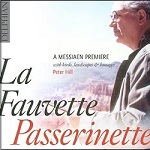 Peter
Hill (piano)
Peter
Hill (piano)
rec. Reid Concert Hall, University of Edinburgh, 23 March and 8 April
2014. DDD.
Details in my full review.
DELPHIAN DCD34141 [78:56] – download (16-bit lossless) or stream
from Qobuz
(NO booklet)
Excellent performances of the core Messiaen works, which include a new
discovery, the piece which gives its name to the title of the album.
It’s all very well recorded and even more superbly annotated in the
booklet BUT a black mark: I couldn’t find any download which included
the booklet, so downloaders will be ignorant of the circumstances of
the title work’s discovery.
I would have preferred an all-Messiaen programme instead of the music
by other composers which is included: good as Peter Hill’s earlier recordings
of the composer are, and inexpensive as they are on Regis, there’s room
for a newer replacement.
Malcolm ARNOLD (1921-2006)
Symphony No.7 (Op.113) [31:52]
Symphony No.8 (Op.124) [24:24]
Concerto for Oboe and Strings (Op.39) [12:24]
Symphony No.9 (Op.128) [47:07]
Jennifer Galloway (oboe)
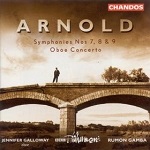 BBC
Philharmonic/Rumon Gamba
BBC
Philharmonic/Rumon Gamba
rec. Studio 7, New Broadcasting House Manchester, January 2001. DDD.
Pdf booklet available
CHANDOS CHAN 9967(2) [56:33 + 59:37] – from theclassicalshop.net
(mp3 and lossless)
This is one of Chandos’ 2-for-1 offers: don’t download from any dealer
who charges as if for two. If you just want these three final symphonies
and the concerto, look no further.
Paul Serotsky – review
– found it very difficult to choose between this and the Naxos recordings,
conducted by Andrew Penny. The Naxos box set which I reviewed
is no longer available, nor is the earlier release which Rob Barnett
made Bargain of the Month – review
– but the CDs and downloads remain available separately and represent
excellent value.
Patric STANDFORD (1939-2014)
First Symphony (The Seasons – An English Year) (1972) [32:49]
Cello Concerto (1974) [27:08]
Prelude to a Fantasy (The Naiades) (1980) [9:28]
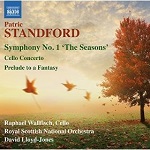 Raphael
Wallfisch (cello)
Raphael
Wallfisch (cello)
Royal Scottish National Orchestra/David Lloyd-Jones
rec. 23-24 November 2011, Henry Wood Hall, Glasgow. DDD
NAXOS/BRITISH MUSIC SOCIETY 8.571356 [69:55] – from classicsonline.com
(mp3, with pdf booklet)
John Quinn reviewed
this in detail in its original incarnation on British Music Society
BMS441CD. It’s still available for download in that form – see
DL
News 2014/7 – but you’ll find the classicsonline.com version of
the Naxos reissue available less expensively and I’m no less enthusiastic
about Standford’s accessible but by no means easy music than I was when
I reviewed
the BMS release shortly after the composer’s death last year.
See also obituary
by Gary Higginson.
RECORDING OF THE MONTH
 Arvo
PÄRT (b.1935) Tintinnabuli
Arvo
PÄRT (b.1935) Tintinnabuli
Sieben Magnificat-Antiphonen (Seven Magnificat Antiphons)
(1988) [13:25]
Magnificat (1989) [7:13]
‘… which was the son of …’ (And Jesus himself began to be) (2000) [7:37]
Nunc dimittis (2001) [5:49]
The woman with the alabaster box (1997) [5:28]
Tribute to Caesar (1997) [6:29]
I am the true vine (1996) [7:10]
Triodion (1998) [13:47]
The Tallis Scholars/Peter Phillips
rec. Chapel of Merton College, Oxford,
January 2014.
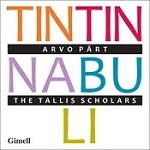 Pdf
booklet includes texts and translations
Pdf
booklet includes texts and translations
GIMELL CDGIM049 [67:06] – from gimell.com
(CD; mp3, 16- and 24-bit lossless and 5.1 surround sound downloads)
or hyperion-records.co.uk
(mp3, 16- and 24-bit lossless). Due for release on 2 March 2015.
The Tallis Scholars rarely step outside their self-imposed restriction
to Renaissance polyphony but the recent reissue of their recording of
the music of John Tavener (Ikon of Light,
GIMSE404 – review)
and this new Arvo Pärt release are exceptions which I’m delighted to
welcome - it is a Recording of the Month for both John Quinn and myself
-
review. The mature music of both composers clearly relates to
older forms, though both had briefly toyed with the avant-garde.
The Scholars manifestly enjoy performing both composers as much as I
enjoyed hearing them and the 24-bit download is excellent. Please
see YouTube
for video of Peter Phillips explaining the Tintinnabuli technique.
Le Poisson Magique : Organ works by John McCABE (1939-2015)
Dies Resurrectionis (1963) [8:07]
Sinfonia, Op.6 (1961) * [14:47]
Prelude (1964) * [4:44]
Johannis-Partita , Op.30 (1964) * [11:01]
Nocturne (1964) * [4:22]
Le Poisson Magique (Meditation after Paul Klee) (1964/2004) *
[5:33]
Carol-Preludes (2008) * [14:29]
Esperanza (2010) * [8:12]
* world premiere recording
Tom Winpenny (organ of St Albans Cathedral)
rec. St Albans Cathedral, Hertfordshire on 20-21 August 2014. DDD.
pdf booklet included.
RESONUS CLASSICS RES10144 [71:43] No CD – download from resonusclassics.com
or eclassical.com
(both mp3, 16- and 24-bit lossless; additionally available in aac from
resonusclassics.com)
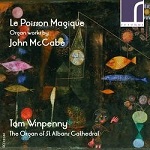
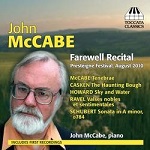 By
an unhappy coincidence, I found myself reviewing this recording, intended
as a tribute in his 75th year, just days after the composer’s
death. I hope he was able to hear it in time, since it makes available
excellent performances of several of his organ works, spread over four
decades, for the first time on record. I can find only one other substantial
recording of John McCabe’s organ music: four pieces, none of them included
on Resonus, on a Naxos recording (8.573053, with his choral music
– review).
With no benchmarks, I can only say that Tom Winpenny’s performances
are persuasive, not least because he plays the neo-classical organ at
St. Albans for which McCabe composed the final and most recent work,
Esperanza.
By
an unhappy coincidence, I found myself reviewing this recording, intended
as a tribute in his 75th year, just days after the composer’s
death. I hope he was able to hear it in time, since it makes available
excellent performances of several of his organ works, spread over four
decades, for the first time on record. I can find only one other substantial
recording of John McCabe’s organ music: four pieces, none of them included
on Resonus, on a Naxos recording (8.573053, with his choral music
– review).
With no benchmarks, I can only say that Tom Winpenny’s performances
are persuasive, not least because he plays the neo-classical organ at
St. Albans for which McCabe composed the final and most recent work,
Esperanza.
The cover depicts the Paul Klee painting which gave its name to the
title piece. Don’t let the abstract art deter you from the music: Le
Poisson Magique and all the other works are both firmly in the English
organ tradition and yet thoroughly individual. The booklet contains
informative notes from the composer and a full specification of the
organ. A fine successor to Winpenny’s recordings of the music of the
Berkeleys (Resonus RES10119 – DL
News 2013/7) and Stanford ( RES10104 – DL
Roundup June 2011/1).
John McCabe’s own farewell piano recital (2010) of music by Frank Bridge,
John Casken, Emily Howard, McCabe’s own Tenebræ, Maurice Ravel
( Valses nobles et sentimentales) and Franz Schubert (Sonata
No.14) is on Toccata Classics TOCC139 – download in mp3 and lossless,
with pdf booklet, from eclassical.com
(no booklet).
For the Hyperion recording of John McCabe’s Edward II (CDA67135/6),
see DL
Roundup June 2011/1 and 5-star review.
The Marian Collection
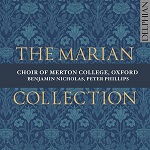 The
Choir of Merton College, Oxford/Peter Phillips, Benjamin Nicholas
The
Choir of Merton College, Oxford/Peter Phillips, Benjamin Nicholas
Charles Warren (organ)
rec. July 2014, Chapel of Merton College, Oxford
DELPHIAN DCD34144 [67:42] – from Qobuz
(16-bit lossless download, no booklet) or stream from Qobuz.
For details please see review
by John Quinn: Recording of the Month
There’s a wide range of music here, from John Nesbett (late 15th-century)
to Matthew Martin (b.1976) and all stops between, all splendidly presented
and recorded. With Qobuz asking £7.99 for their lossless download,
with others charging £8.49 or more for mp3, the choice is something
of a no-brainer, apart from the lack of a booklet from any download
source.
American Compositions
Leonard BERNSTEIN (1918-1990) Candide Overture [4:26]
Cleveland Pops Orchestra/Louis Lane
rec. 1958 ADD/stereo
William SCHUMAN (1910-1992) New England Triptych [15:29]
New York Philharmonic Orchestra/André Kostelanetz
rec. 1958 ADD/stereo
Aaron COPLAND (1900-1990) The Tender Land : Suite [20:44]
Boston Symphony Orchestra/Aaron Copland
rec. 1960 ADD/stereo
Samuel BARBER (1910-1981) Adagio for Strings, Op.11 [7:45]
Philadelphia Orchestra/Eugene Ormandy
rec. 1957 ADD/stereo
George GERSWHIN (1898-1937) An American in Paris [18:06]
Columbia Symphony Orchestra/Leonard Bernstein
rec. 1959 ADD/stereo
BEULAH 2PDR1 [66:30] – from Amazon
UK
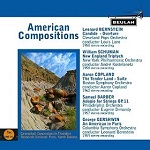
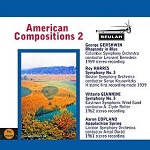 Pending
my full review of this release on the main pages of MusicWeb International,
the headline news is that this is a very worthwhile combination of some
better-known and lesser-known Americana of the 20th century.
The performances of the Copland and Gershwin are still available in
different couplings and they and the recordings have stood the test
of time well in these transcriptions. Unless you already have those
alternative couplings, this is very well worth considering.
Pending
my full review of this release on the main pages of MusicWeb International,
the headline news is that this is a very worthwhile combination of some
better-known and lesser-known Americana of the 20th century.
The performances of the Copland and Gershwin are still available in
different couplings and they and the recordings have stood the test
of time well in these transcriptions. Unless you already have those
alternative couplings, this is very well worth considering.
A second volume – American Compositions 2: 3PDR1 – from
Amazon
UK – couples George Gershwin’s Rhapsody in Blue (Bernstein
with the NYPO, 1959), Roy Harris Symphony No.3 (Boston SO/Koussevitzky,
1939), Vittorio Giannini Symphony No.3 (Eastman Symphonic Wind
Band/Roller, 1962) and Aaron Copland Appalachian Spring
(LSO/Antal Doráti, 1961). Apart from the fact that you might have preferred
a different arrangement of couplings – the two Gershwin works and the
two Coplands together, for example – this too is a desirable album,
though you would need a more modern recording of the Harris symphony
in addition to this vintage Koussevitzky offering. Look out for full
reviews of both these releases.











